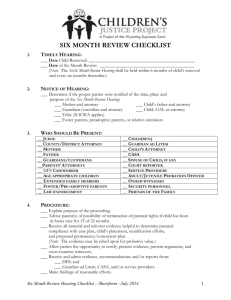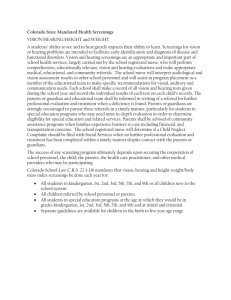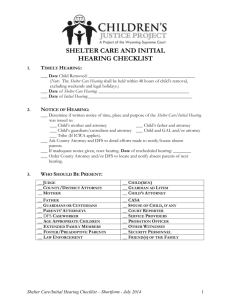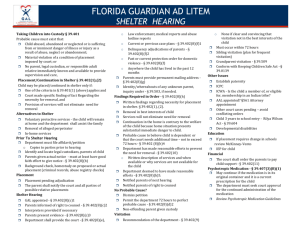SHELTER CARE AND INITIAL HEARING CHECKLIST
advertisement
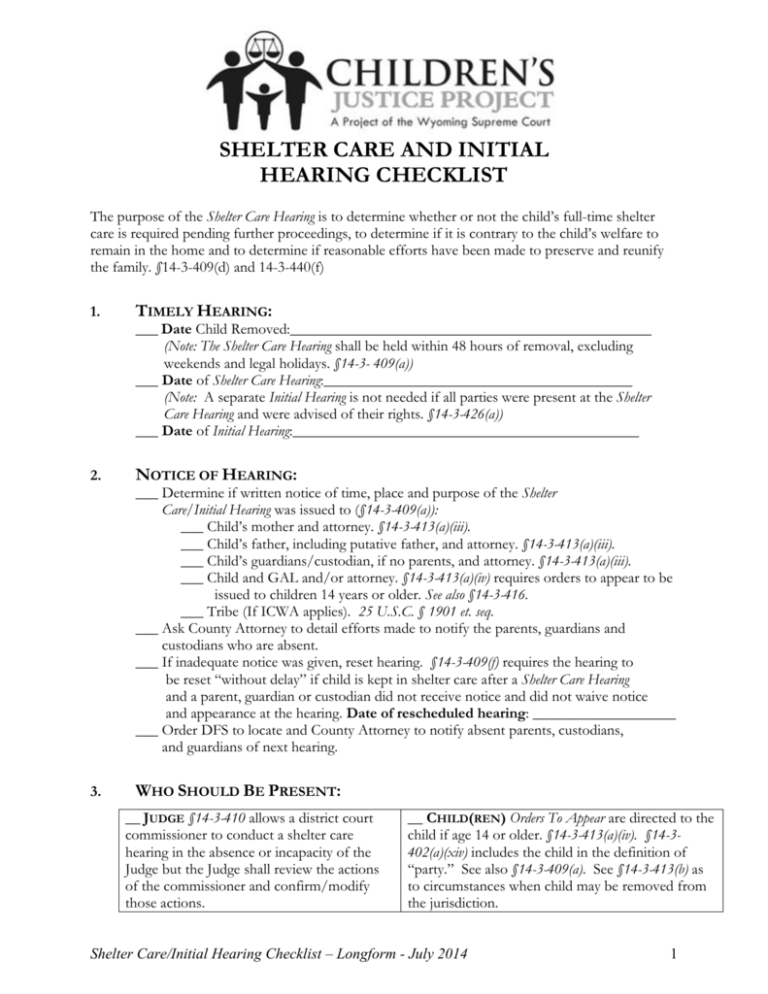
SHELTER CARE AND INITIAL HEARING CHECKLIST The purpose of the Shelter Care Hearing is to determine whether or not the child’s full-time shelter care is required pending further proceedings, to determine if it is contrary to the child’s welfare to remain in the home and to determine if reasonable efforts have been made to preserve and reunify the family. §14-3-409(d) and 14-3-440(f) 1. TIMELY HEARING: ___ Date Child Removed:________________________________________________ (Note: The Shelter Care Hearing shall be held within 48 hours of removal, excluding weekends and legal holidays. §14-3- 409(a)) ___ Date of Shelter Care Hearing:_________________________________________ (Note: A separate Initial Hearing is not needed if all parties were present at the Shelter Care Hearing and were advised of their rights. §14-3-426(a)) ___ Date of Initial Hearing:______________________________________________ 2. NOTICE OF HEARING: ___ Determine if written notice of time, place and purpose of the Shelter Care/Initial Hearing was issued to (§14-3-409(a)): ___ Child’s mother and attorney. §14-3-413(a)(iii). ___ Child’s father, including putative father, and attorney. §14-3-413(a)(iii). ___ Child’s guardians/custodian, if no parents, and attorney. §14-3-413(a)(iii). ___ Child and GAL and/or attorney. §14-3-413(a)(iv) requires orders to appear to be issued to children 14 years or older. See also §14-3-416. ___ Tribe (If ICWA applies). 25 U.S.C. § 1901 et. seq. ___ Ask County Attorney to detail efforts made to notify the parents, guardians and custodians who are absent. ___ If inadequate notice was given, reset hearing. §14-3-409(f) requires the hearing to be reset “without delay” if child is kept in shelter care after a Shelter Care Hearing and a parent, guardian or custodian did not receive notice and did not waive notice and appearance at the hearing. Date of rescheduled hearing: ___________________ ___ Order DFS to locate and County Attorney to notify absent parents, custodians, and guardians of next hearing. 3. WHO SHOULD BE PRESENT: __ JUDGE §14-3-410 allows a district court commissioner to conduct a shelter care hearing in the absence or incapacity of the Judge but the Judge shall review the actions of the commissioner and confirm/modify those actions. __ CHILD(REN) Orders To Appear are directed to the child if age 14 or older. §14-3-413(a)(iv). §14-3402(a)(xiv) includes the child in the definition of “party.” See also §14-3-409(a). See §14-3-413(b) as to circumstances when child may be removed from the jurisdiction. Shelter Care/Initial Hearing Checklist – Longform - July 2014 1 Shelter Care/Initial Hearing Checklist – Longform - July 2014 2 __ COUNTY/DISTRICT ATTORNEY §14-3402(a)(xiv) includes the State as a party. __ MOTHER __ FATHER Including putative. § 14-3-409(a) __ GUARDIANS OR CUSTODIAL PARENTS, IF NO PARENTS §14-3-409(a) __PARENTS’ ATTORNEYS Appoint at earliest possible stages/separate attorney if conflict warrants. __GUARDIAN AD LITEM Appoint GAL if not already done. §14-3-416 __ CHILD’S ATTORNEY §14-3-211 __ CASA __ SPOUSE OF CHILD, IF ANY §§ 14-3-412(b)(ii) and 14-3-413(a)(iii) __ COURT REPORTER §14-3-424 (a) requires the Adjudicatory and Dispositional Hearings to be recorded. Suggested Additional Persons (Best practices): __ DFS CASEWORKER __ AGE APPROPRIATE CHILDREN __ EXTENDED FAMILY MEMBERS __ FOSTER/PREADOPTIVE PARENTS __ LAW ENFORCEMENT 4. __ SERVICE PROVIDERS __ ADULT/JUVENILE PROBATION OFFICER __ OTHER WITNESSES __ SECURITY PERSONNEL __ FRIENDS OF THE FAMILY PROCEDURE: Upon agreement, the Initial Hearing may be combined with the Shelter Care Hearing. §14-3-426 The hearing shall be on the record. §14-3-424(a). ___ Explain the purpose of the proceedings and give advisement of rights. ___ Receive all relevant and material evidence helpful to determine the need for shelter care even though evidence may not be competent in an Adjudicatory Hearing. §14-3-409(e). ___ Receive all material and relevant evidence helpful to determining questions of placement, reasonable efforts, and child’s well-being. This evidence may be relied upon for probative value. §14-3-426(d) (See Sections 7, 8, and 9). ___ Allow parties/counsel to examine and contest written reports received as evidence and cross-examine persons making the reports. §14-3-426(d). ___ Appoint a Multidisciplinary Team within 10 days of filing the petition. §14-3-427(b), (c), and (d). §14-3-427(b) addresses composition of MDT. ___ Order DFS to prepare a Predisposition Study and Report. §14-3-427(a) addresses requirements of report. If the child is to be placed in residential treatment, there are additional requirements for the report. §21-13-315(d). ___ Make contrary to the welfare and reasonable efforts findings. §14-3-440 ___ Make findings as to whether shelter care was necessary or still is necessary to keep the child safe. 5. ADVISEMENT OF RIGHTS AND PURPOSE OF PROCEEDINGS: §14-3-409(b) requires an advisement of rights be given at the Shelter Care Hearing. §14-3-426(a) requires at the Initial Hearing, which may be held after a Shelter Care Hearing, the child, parents, and guardians be advised of their rights under the law, the specific allegations in the Petition and possible liability for costs of services and treatment. ___ Contents of Petition and nature of allegations. §§14-3-409 (a), 412, 423(a) and 426(a). Petition contents: Child’s name, DOB, address; name and address of parent(s) including putative fathers, guardians, custodians and/or child’s spouse, if any; whether child is held in shelter care; name and address of shelter care facility; date shelter care commenced; and facts which bring the child under court’s jurisdiction. Parents, custodians, guardians shall be provided with copy of Petition and allegations. The Petition is to be promptly filed. § 14-3-409(a). The party has a right to charges against him. §143-423(a) Shelter Care/Initial Hearing Checklist – Longform - July 2014 3 ___ Right to legal counsel. §14-3-422. (Note: If parent(s) are indigent he/she may have courtappointed counsel.) ___ Determine whether parent(s) will retain their own legal counsel, insist they not be represented, or request court-appointed counsel. ___ Ask parent(s) to complete Financial Affidavit or verify financial condition under oath. §14-3-422(b) ___ Advise that Financial Affidavit will be used to determine if entitled to legal counsel. ___ If parent(s) DO qualify, appoint legal counsel. ___ Right to confront and cross-examine witnesses. §§14-3-409(b)(iii) and 423(a)(ii) ___ Right to present witnesses and introduce evidence. §§14-3- 409(b)(iii) and 423(a)(ii) ___ Right to issue of subpoenas by the Court to compel the appearance of witnesses or the production of evidence. §§ 14-3-409(b)(iii), 14-3-417 and 14-3-423(a)(iv) ___ Right to jury trial. (Note: Parents must make demand for jury trial within 10 days of being advised of this right. §§14-3-423(b) and 409(b)(iv)) ___ Right to appeal. §§14-3-432 and 409(b)(v) ___ Advise of liability for the costs of treatment and services. §14-3-426(a) ___ Advise that Petition to Terminate Parental Rights may be filed after 15 of the most recent 22 months. §§14-2-309(a)(v) and 14-3-431(m) (Note: There are exceptions to the 15 out of 22 rule requirement if the child is in relative care, DFS has documented a compelling reasons, or DFS has not provided necessary reunification services. Federal regulations offer the following examples of compelling reasons: adoption is not an appropriate permanency plan for the child, there are no ground to file a TPR, the child is an unaccompanied refugee minor, or an international legal obligation or compelling foreign policy reason would preclude termination.) ___ Advise parents they can be punished for contempt of court for failing to abide by court order. 6. ADMISSIONS: ___ Give parents/custodians/guardians opportunity to admit or deny the allegations. (Note: If parent(s) deny allegations, set Adjudicatory Hearing within 60 days. §14-3-409(c). If the allegations are admitted, the court shall make the appropriate adjudication and may proceed immediately to a disposition of the case. § 14-3-426(a). ___ Determine competency of admitting party: ___ Ask parent(s) if under the influence of alcohol or drugs. ___ Ask parent(s) if they understand proceedings. ___ Ask parent(s) if able to read/speak English, or have impediments that make it so cannot proceed (not statutorily required). ___ Determine which allegations of the Petition have been admitted. ___ Receive factual basis under oath and on the record. §14-3-424(a) 7. PLACEMENT OPTIONS: ___ Ask DFS to provide details of child’s proposed placement pending further proceedings. ___ Determine whether the placement proposed by DFS is the least disruptive and least restrictive and most family-like setting that meets the needs of the child. §14-3-407(b)(i). (Note: Alternative placements to foster care should be considered when the child cannot be placed in the home(i.e. Are responsible relatives or friend of the family available to care for the child pending further proceedings?) ___ Determine if paternity has been established in order to consider noncustodial parent as placement option. Shelter Care/Initial Hearing Checklist – Longform - July 2014 4 CHOOSE ONE OF THE FOLLOWING PLACEMENTS OPTIONS: ___ Leave child in home without DFS supervision and without services. §14-3-409(d). ___ Leave child in the home with DFS supervision. §14-3-409(d)(i). ___ Remove or continue removal of child from home and place or continue to place with DFS due to following reasons (§§14-3-409(d) and 14-3-406(a)): ___ Prevent removal of child from jurisdiction. ___ Protect child. ___ Child has no parent, guardian or other responsible adult to provide care and/or supervision. ___ Other reasons: ______________________________________________ ___ Remove or continue removal of child from home and place or continue to place with someone other than DFS. §14-3-409(d)(i). ___ Return child to the home. 8. CHILD’S WELL-BEING & FAMILY SERVICES: SERVICES: ___ Ask DFS to address services that will allow the child to remain/return safely at home. §14-3-440(e) requires that services be accessible, available and appropriate. ___ If services are not available that will allow child to remain/return safely in the home, ask DFS to address what services the child and family need. Types of services available to child and parent: ___ Home visits/monitoring by DFS/CASA/others. ___ Parenting classes. §14-3-429(d) ___ Physical and/or mental examinations. (Note: §14-3-419 allows mental and physical examinations of the child to determine the child’s physical and mental condition. §14-3-420 addresses emergency treatment of a child.) ___ Counseling. (e.g., substance abuse/mental health) ___ Substance abuse/psychological evaluations. ___ Urinalysis/breathalyzers. ___ Child care. ___ Medical care including vaccinations, medications, eyes, dental. §14-3-420 ___ Other: ______________________________________________________ ___ Determine if parent(s), prior to adjudication will voluntarily agree to participate in such services. If yes, order such services. ___ Address whether releases need to be signed by the parent(s) to allow access to records of child/parent(s). ___ Order restraining orders/no contact orders expelling an allegedly abusive parent from the home, limiting associations, or limiting travel. §14-3-430(a) and (b) ___ Issuance of temporary restraining orders. §14-3-208(d), ordering medical and mental health assessments, ordinary and emergency care for a child. VISITATION: ___ Determine if DFS has a proposed visitation plan. ___ If no, order DFS to address visitation between the child and the parents and siblings. §14-3-430(b)(iii). ___ Determine whether visitation should be supervised/unsupervised. ___ Advise the parent(s) that timely appearance and sobriety is expected and to contact DFS if unable to make visit. ___ Determine if all parties are in agreement of proposed visitation plan. Shelter Care/Initial Hearing Checklist – Longform - July 2014 5 EDUCATIONAL ISSUES: The Predisposition Report that is ordered after a Petition is filed shall address (a) the child’s education needs, §14-3-427(a); (b) performance of the child in school, §14-3-427(a)(ii); and (c) learning disabilities, §14-3-427(a)(ii). (Note: Best Practices recommend that a child’s education status be addressed at all hearings regarding a child’s placement. Statistics show a definite link between school mobility and school difficulties.) ___ Determine which school the child is enrolled and grade. ___ Determine whether there are problems with absences, truancies, suspensions. ___ Determine whether the child has physical, emotional or mental health issues that impair his/her ability to learn, attend, interact appropriately. ___ Determine whether the child has been evaluated for special education eligibility. ___ Determine whether the child has an IEP, IFSP or 504 plan. ___ Determine who will ensure that child’s educational needs are met. ___ If any of the above issues are not known, order DFS to gather the information about child’s educational history and educational needs prior to next hearing. 9. CONTRARY TO THE WELFARE AND REASONABLE EFFORTS FINDINGS (ASFA REQUIREMENTS): ___ Ask DFS to detail efforts made to avoid protective placement of child. §§14-3407, 409 and 440 ___ Determine whether continuation in the home would be contrary to the child’s welfare (Note: This finding shall be made at the first court hearing authorizing the child’s removal and must be detailed and child specific): ____________________________________________________________________ REASONABLE EFFORTS FINDINGS (Note: R/E Findings must be detailed/child specific.) (Choose one (1) of the following three (3) options): ___ DFS made reasonable efforts to prevent or eliminate the need for placement, including:____________________________________________________________ ___ The lack of efforts by DFS to prevent/eliminate need for removal was reasonable due to the following emergency circumstances: _______________________________ ____________________________________________________________________ ___ DFS has NOT made reasonable efforts to prevent or eliminate the need for placement because: ____________________________________________________ Note: For an Indian child and ICWA case, DFS shall show “active efforts” to prevent placement. 25 USCA 1912(d). REASONABLE EFFORTS NOT REQUIRED ___ Reasonable efforts are not required when the court finds clear and convincing evidence that: ___ Parent has been convicted of murder or voluntary manslaughter of another child of the parent. §14-2-309(b)(i). ___ Parent has been convicted of aiding and abetting, attempting, conspiring to commit or soliciting such a crime. §14-2-309(b)(i). ___ Parent has been convicted of felony assault that results in serious bodily injury to a child of the parent. §14-2-309(b)(ii). ___ Parent had their parental rights involuntarily terminated to another child. §14-2-309(c)(i). ___ Parent has abandoned, chronically abused, tortured, or sexually abused the child. §14-2-309(c)(ii). Shelter Care/Initial Hearing Checklist – Longform - July 2014 6 __ The parent has been convicted of committing one or more of the following crimes: sexual assault under W.S. 6-2-302; sexual battery under W.S. 6-2-313; and sexual abuse of a minor under W.S. 6-2-314 through 317. §14-2-309(c)(iii). ___ The parent is required to register as a sex offender pursuant to W.S. 7-19-302 if the offense involved the child or another child of that parent. § 14-2-309(c)(iv). ___ Other aggravating circumstances exist indicating there is little likelihood that services will result in successful reunification. §14-2-309(c)(v). ___ Child is abandoned at less than 1 year of age and has been abandoned for at least 6 months. §14-2-309(a)(vi) (see also §14-3-431(e) and §143-440(g)). (Note: § 14-3-440(g) directs the court to § 14-2-309(a)(vi), (b) and (c) for a listing of actions that result in the waiver of reasonable efforts. Wyoming Statute § 14-2-309 alone is a list for terminating parental rights). 10. SCHEDULE NEXT HEARING: ___ Initial Hearing Date (if needed):____________________________________________ ___ Adjudicatory Hearing Date (§14-3-409(c) requires it to be held within 60 days of the initial hearing, unless there is a finding of good cause to delay the hearing, but in no case more than 90 days from the date the petition is filed): ____________________ ___ Disposition Hearing Date (must be held within 60 days, if allegations admitted): ___________________________________________________________ ___ Permanency Hearing Date: ________________________________________________ (Note: §14-3-440(g) requires a Permanency Hearing be held within 30 days of the Court’s determination that reasonable efforts to preserve and reunify the family are not needed under §14-2-309(a)(vi), (b) or (c), otherwise the hearing must be held within 12 months of child’s removal from the home.) Shelter Care/Initial Hearing Checklist – Longform - July 2014 7


